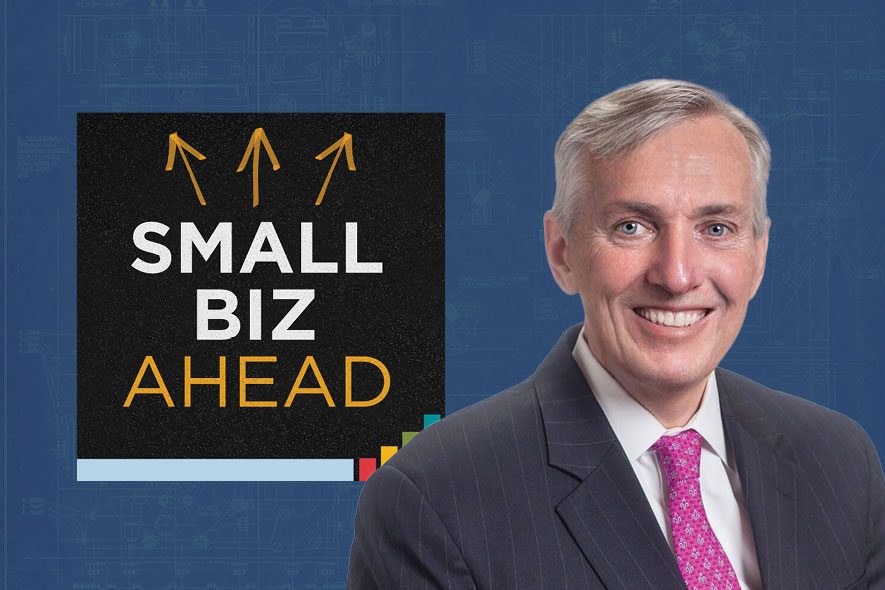Transcript
The views and opinions expressed on this podcast are for informational purposes only, and solely those of the podcast participants, contributors, and guests, and do not constitute an endorsement by or necessarily represent the views of The Hartford or its affiliates.
You’re listening to the Small Biz Ahead podcast, brought to you by The Hartford.
Our Sponsor
This podcast is brought to you by The Hartford. When the unexpected strikes, The Hartford strikes back for over 1 million small business customers with property, liability, and workers compensation insurance. Check out The Hartford’s small business insurance at TheHartford.com.
Gene (00:02):
Hey everybody, this is Gene Marks and welcome to this week’s episode of the Hartford Small Biz Ahead Podcast. I wanna talk to you this week about saving money on your company’s health insurance, your business health insurance. My assumption is that you are offering health insurance or considering offering health insurance to your employees, and you want to control those costs. Obviously, it’s at a significant cost. So I’m gonna offer you three suggestions. Now, please be aware, I am not a health insurance expert. I’m not a broker. I’m not an insurance agent. I’m not, I do cover this issue a lot for the places that I write. And I also have a lot of clients that have done things to save money on their health insurance. I’ve learned a lot from. So, I wanted to share with you three ways that I’m seeing my clients, small business owners, what they’re doing to save on their health insurance this year.
Gene (00:54):
And yeah, not included in this is, you could always get cheaper health plans and increase your deductibles and all of that, but you wanna try and provide the best health insurance possible for your employees to try and stay competitive, but also make it affordable. So, way number one is to offer an HRA health reimbursement account. An HRA gives you the ability to put pre-tax money into your employee’s account so they can use it to purchase their own health insurance. So instead of having your own health insurance plan, you’re effectively saying to your employee, “Hey, I’m gonna give you this money…
Gene (01:51):
You’re not gonna get taxed on it.” And by the way, you, as the business owner, get a deduction, but I’m gonna give you this money employee, and you take it and you get your own health insurance. You can provide a list of, maybe potential, local brokers that they can talk to. They can go to the affordable Healthcare Act, health exchanges in your estate as well, but you’re really leaving the purchase decision for the health insurance up to them. Most of my clients who do this, contribute the same amount of money to an employee’s HRA as they were previously paying for that employee’s health insurance. So how does this save you money? Well, in a couple of ways. First of all, it takes away all the administration time. No longer do you have to deal with reimbursements or answering questions about a health plan or negotiating with the healthcare provider every year. You’re just not, you’re basically just putting a deposit into their HRAs and letting your employees deal with their own health insurance. And the other thing it does is, it tends to minimize your liability, particularly under privacy.
Gene (02:59):
I mean, a lot of business owners like myself don’t wanna get involved in our employees health insurance decisions. So, I don’t wanna know about my employees health. It makes me a little bit nervous here. You’re just, you’re not, you don’t have to know about medical history or anything like that. Sometimes that comes out when you’re negotiating for a health insurance plan. So instead, again, you’re just giving your employees the money and they’re taking it and buying their own health insurance with it. So by administrative time saved, that also saves you money as well. So, consider an HRA. You can have an HRA standalone or you can have one along with your existing health insurance plans, but I’ve seen them explode in popularity over the past few years. That’s number one. Number two, consider a captive insurance program. You can google captive insurance providers in your state or near you, and you will likely find organizations that provide captive insurance.
Gene (03:51):
Captive insurance used to be something for larger companies and now it is very much filtering its way down to smaller and mid-size companies. And what is it exactly? Well, a captive insurance plan is really just an entity that’s made up of a bunch of companies and all of their employees, which are part of this entity, so that the entity can go out and negotiate health insurance rates that are lower because they’ve got purchasing power behind them. So, if you join a captive insurance program, it’s a form of self-insurance, by the way. You’re gonna be asked to contribute a certain amount until the managers of the captive insurance plan get to know your history. But what’ll happen is the amount that you contribute will then be considered with all the other contributions that all your fellow employers are making.
Gene (04:41):
You’re all gonna be sharing your own medical histories, good or bad of your employees. And depending on the demographics and depending on how well your captive is managed, better healthcare rates can be negotiated to the extent where you’re paying in a monthly premium every month. And then when there’s a look back, you might be getting money back. Or the next year, your premiums might even be lower being based on the captive insurance entities performance. So again, you can really view a captive insurance program as just a way, it’s like a purchasing group. You’re jumping in with a bunch of other employers and together you’re pulling your employees and pulling your money together and handing over the responsibility to manages to negotiate better health insurance rates and plans and benefits for all of your employees to share.
Gene (05:34):
That’s what a captive insurance program is. And again, it used to be a thing for bigger companies, but now a lot of smaller businesses are jumping on the bandwagon. So check out captive insurance and investigate it. It might be an option for you as well. Finally and thirdly is also a form of self-insurance as well. It’s called level funded plans. There are other names for them as well, but level funded is sort of generally accepted across the industry. And I’ve got a few clients that use level funded plans. You can ask your healthcare administrator or broker or your healthcare advisor about this. But essentially what a healthcare plan, a level funded plan is, it is a form of self-insurance as well. You’re not joining a captive insurance company. You’re just, you’re having a separate kind of health plan.
Gene (06:21):
And what level funded plans are this? Essentially and to put it, as simply as possible, you basically pay for a lot of your employees out of pocket costs at the lowest level, and then the group insurance plan kicks in. So, for example, it’s just using round numbers. Say for every employee, I’m gonna pay a thousand dollars of their out-of-pocket costs. You tell the employees, listen, whenever you’re visiting the doctor, you have an issue or whatever, up to a thousand bucks, come and see me, and I’m gonna write you a check for that thousand dollars up to a thousand dollars. After that, a group insurance plan kicks in because obviously the group insurance plan is there to protect against any sort of catastrophic events. So you’re self-insuring at the lowest level.
Gene (07:09):
Now, why does this make sense for a lot of companies? Well, if you’re just getting a group insurance plan for all of your employees, and you’re paying the premiums for those employees, depending on the demographics of your company, you probably have a bunch of employees that aren’t even using it at all. Maybe they’re just younger or healthier. They’re just, they’re not going to the doctors. They haven’t had any major health issues. They’re not going to the hospital. So here you are paying for group insurance for these people, and they’re not even using this service at all. So what you do instead is you say listen we’ll pay and reimburse the people that are actually having healthcare issues up to a thousand bucks. And then the group insurance plan kicks in and because the group insurance plan is kicking in after you’ve self-insured at a certain level, the rates for that group insurance plan tend to be lower because you’re taking more of the risk on the first initial expenses.
Gene (08:02):
I hope that makes sense. So talk to your insurance broker or your expert about health insurance or an administrator about level funded plans. It could make a lot of sense for your business. So let me recap. Okay, number one, consider HRAs, health reimbursement accounts for your employees. That takes you out of the insurance business. Basically just have you set up these deferred tax accounts, tax free accounts and you contribute to them and your employees go on their own and buy their own health insurance. Cuts down your administrative time and certainly your any type of potential HIPAA or privacy liabilities. Number two, consider joining a captive insurance program. Google to see if there’s captive insurance providers in your area. That basically means you’re joining a big buying group of health insurance benefits, that you would become a part of, for better or for worse, but usually for the better.
Gene (08:57):
Based on how well that group is managed, you could be saving a lot of money. Finally, consider a level funded insurance plan. That is where you pay you self-Insure for like the first initial amounts that are being spent, maybe 500 or a thousand bucks per employee. And then the group insurance plan kicks in. So, if you have employees with a good health history and you have a good demographic of not using healthcare providers, it’s a great way to save on your health insurance because you won’t be paying for health insurance they’re not using, and then you do pay for it when they do use it. So, a level funded plan is something you should definitely consider. Hope this information helps you and hope it helps you save on your healthcare costs in 2023. It’s a big expense. I get that. My name is Gene Marks. You have been listening to this week’s episode of the Hartford Small Biz Ahead Podcast. If you want any advice or tips or help running your business, please visit us at SmallBizAhead.com or SBA.TheHartford.com. Again, my name is Gene Marks. Thanks for joining. We will see you again next week. Take care.
Download Our Free eBooks
- Ultimate Guide to Business Credit Cards: The Small Business Owner’s Handbook
- How to Keep Customers Coming Back for More—Customer Retention Strategies
- How to Safeguard Your Small Business From Data Breaches
- 21 Days to Be a More Productive Small Business Owner
- Opportunity Knocks: How to Find—and Pursue—a Business Idea That’s Right for You
- 99 New Small Business Ideas





